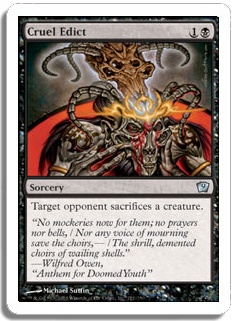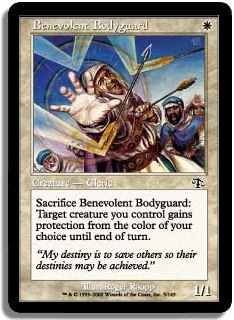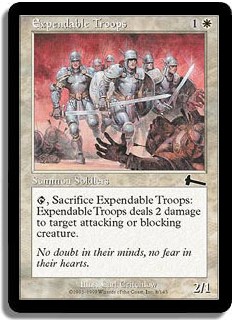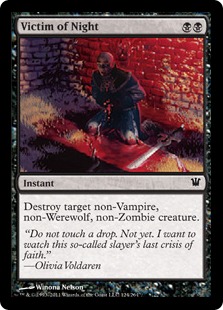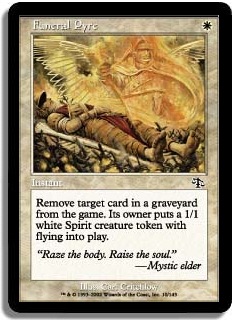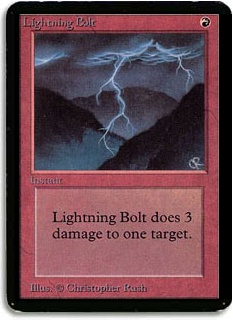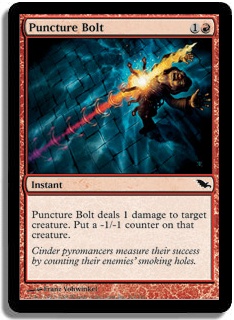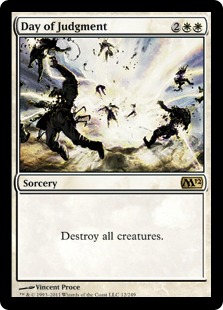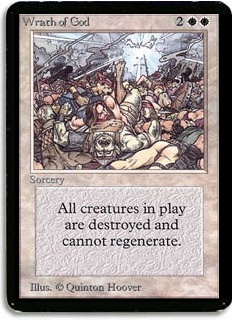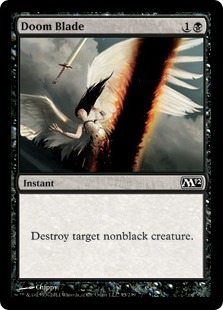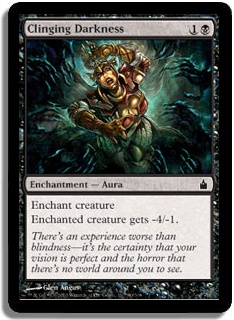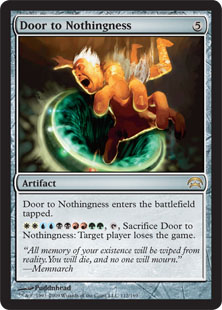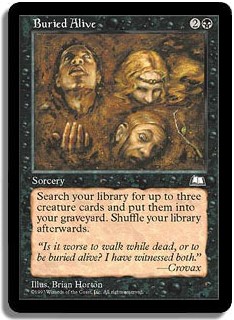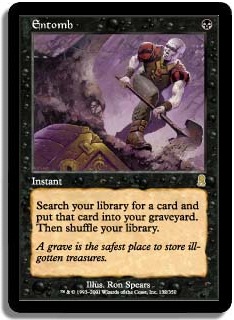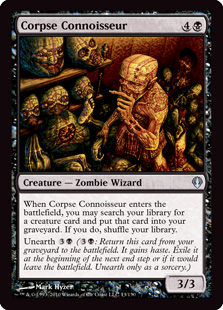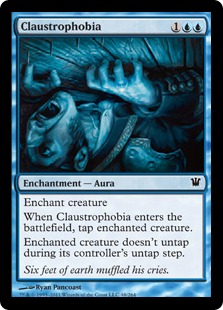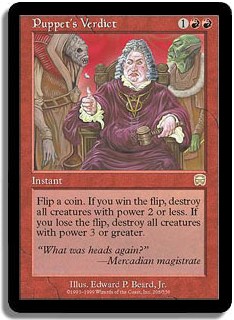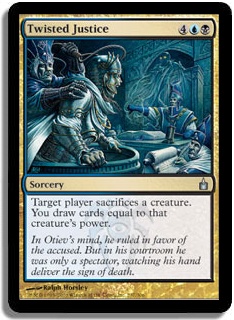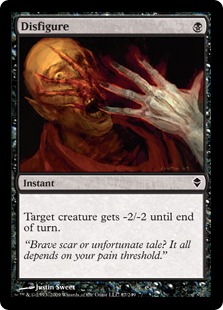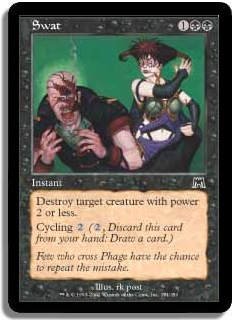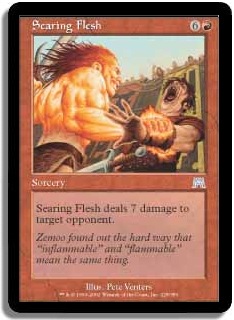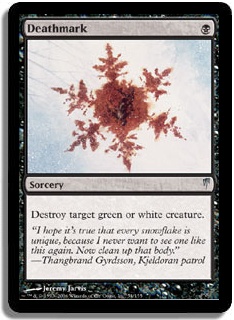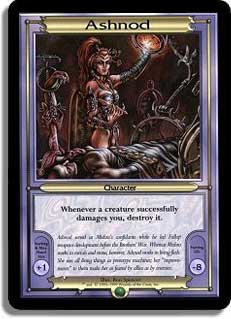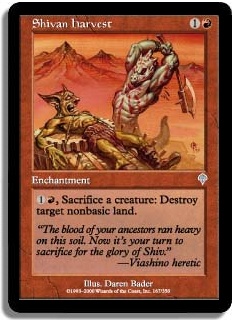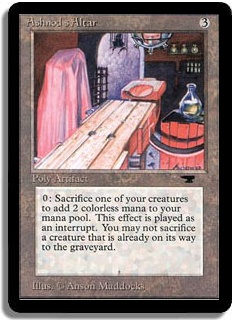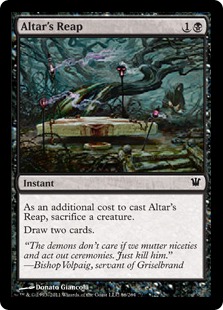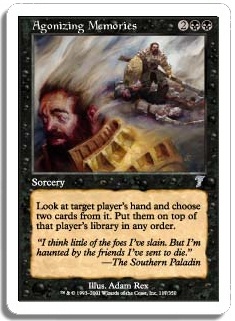“Dulce et decorum est pro patria planeswalker mori.” —Horace, if the ancient Roman poet had been a Magic player
The original line, from Horace’s Odes, has had many translations into English; a literal one might read, “It is sweet and fitting to die for the fatherland.” It has been used sincerely, as in the Memorial Amphitheater at Arlington National Cemetery,* dedicated in 1915. By contrast, British trench poet Wilfred Owen (quoted on the 9th Edition version of Cruel Edict) labeled Horace’s line “the old Lie” in his poem “Dulce et Decorum Est,” a condemnation of the world war that would claim his life.
*If you’re an American and haven’t been to the cemetery, go. I don’t know how it will change you, but it will. Beyond the usual memorials such as the Tomb of the Unknowns, I recommend Section 60, Site 8544, the grave of Spc. Ross A. McGinnis.
The Memorial Amphitheater was meant to honor sacrifice for country; Wilfred Owen mocked the notion from beyond the grave and asked what could be sweet or fitting about death, especially the novel horror of World War I, chemical warfare. Even the dark imaginations of Earth’s war inventors, though, are restricted by the science of their times. In Magic, where creatures are summoned to strange new realities beyond their control to fight, not for country but for Planeswalker, death can be far worse.
What are Magic’s most horrible fates? Like the hands of a Doomsday Clock, we can count them down. My least favorite card in Odyssey block was Benevolent Bodyguard; a friend had a deck that used him to great effect. Put yourself in the Benevolent Bodyguard’s sandals for an article as I put him through his paces. This has been a long time coming…
Smile while you can, buddy.
10. Ready to Die, Then You Aren’t, Then You’re Dead
What goes through the mind of a Benevolent Bodyguard or a soldier among the Expendable Troops when sacrificed?
Imagine you’re the Benevolent Bodyguard, a Human Cleric raised or drilled to believe that your purpose is to die for others. It’s utterly at odds with much of Western thought, where the usual limits of altruism demand living for others, not the opposite. Nonetheless, it’s your culture’s “thing.” You don’t question it. Why would you? Your moment will come.
It does come, and you fulfill what you believe is your duty. Then you discover death hurts. A lot. You can hold in the pain, though, because your mission is… no. It’s not a failure. It can’t be a failure.
But it is because the enemy planeswalker cast Victim of Night right over your act of heroic self-sacrifice.
You’re in one heap on the ground, your guts are in another, and the person you were supposed to save is in a third. In your last fraction of a second of life, you have a crisis of faith. What was it for?
Then you die.
9. The Chump-Block
So you, Benevolent Bodyguard, get tossed onto a Funeral Pyre. You come back as a 1/1 Spirit creature token. At least there’s an afterlife on this plane, and you’re hanging out with six of your spirit buddies… that’s good, right?
Unfortunately for you, the same jackass who kept you from fulfilling your mission in the first place just cast Emrakul, the Aeons Torn. If you had a mind, it would’ve blown a gasket by now. Emrakul attacks the planeswalker controlling you. Your six spirit buddies drop dead on the spot, but you… you are still around. You feel the command: Go. Stop Emrakul. Let me live another turn.
You can’t resist. Maybe this was my true destiny after all. You float up, in all your 1/1 flying Spirit glory, to block Emrakul. The Eldrazi reaches out with one tentacle—doesn’t touch you, just reaches out. You halt and tumble out of the sky. The last few meters to the ground seem to take forever.
Then you die.
8. Bolt from the Blue
You get shuffled up for another game. Once more, you land on an unfamiliar plane. What is this place? You look around. Where are the others? I’m supposed to guard someone…
Something happens—it’s over so quickly it’s hard for you to tell. A Lightning Bolt descends from the sky. A Firebolt reaches out and torches you. A Puncture Bolt would have weakened you forever, had it not obliterated you outright.
Fire and lightning may work quickly and disappear, but the aftereffects are not so merciful. You lie on the ground, smoldering, twitching. The pain seems to last longer than you could have imagined.
Then you die.
7. Sinner in the Hands of an Angry God
You’re shuffled up again, Benevolent Bodyguard. You land in the plane and look up. No clouds—instead you see a roof. Holy symbols everywhere. They don’t strike you as vicious, but peaceful. In front of you, atop an altar, is a book. You open it. You don’t recognize the words, yet you understand them:
“…you are thus in the hands of an angry God; ’tis nothing but his mere pleasure that keeps you from being this moment swallowed up in everlasting destruction.”
You don’t like this Jonathan Edwards. You put the book down. Then the walls of the cathedral shake, and it seems the world is ending.
A pack of werewolves rampages through the cathedral in a Blasphemous Act, but by a miracle, you are untouched. The Day of Judgment arrives, and you feel as if you will be destroyed, but by another miracle you are renewed—regenerated.
Then the Wrath of God turns on you. You ask for a third miracle and get the wrong one: another gift of regeneration.
Then you die.
6. The Void
Shuffled up once more. You land in something like an eastern European city, only the first person who passes you is an anthropomorphic elephant. She has a strong spiritual bent, and you are intrigued, so you follow her. Another Benevolent Bodyguard joins you, only to sacrifice himself to spare the elephant—she calls herself a “Loxodon”—from a Doom Blade. You have the worse fate. In one instant, you are walking behind her on a cobblestone street. In the next, there is nothing around you—nothing at all.
You cannot find your way to the elephant, to food, to drink, to anything. You crawl through the Clinging Darkness until you collapse from dehydration. You look up once and see the faint outline of the door. You do not learn that it is a Door to Nothingness.
Then you die.
5. Buried Alive
Every day, your planeswalker’s shufflin’…
It’s a new game, and you, Benevolent Bodyguard, don’t even get to see the battlefield. Instead, you get dirt… lots and lots of dirt. You’ve gone straight to the graveyard. You don’t know if Buried Alive, Entomb, or a Corpse Connoisseur is responsible, but you don’t care, because knowing what’s responsible won’t stop you from choking on the dirt.
You’re taken out of the graveyard—not by the divinity you prayed to but by your planeswalker casting Resurrection—and you land on the battlefield, hands on knees, lungs screaming. In the distance, you see the enemy planeswalker, and she is displeased by your appearance, so she magically locks you in a coffin.
I knew the smile wouldn’t last forever.
Claustrophobia sets in. Now it’s your voice screaming, with no one to hear it. You feel another creature nearby, a rattling zombie mockery of life, and a command: Go. Save it.
You do not like zombies, but you could not resist the command if you wanted, and anything short of choking on dirt would be better than dying in your wooden coffin. You break free of the coffin just in time to save an undead creature from going back to the graveyard.
Then you die.
4. Caught in the System
Another game, another fate. This time you go from the library to… what looks like a library. Then you learn that the only books around are law books; you’re really in a courthouse, and you’re in custody. If you’d read The Tough Guide to Fantasyland, you’d start cursing because this can’t possibly end well for you. As it is, though, all you know is the record of Orim’s Arrest on Mercadia, and she came through all right—it was close, but the truth came out in time.
You learn quickly that this trial will not be like Orim’s. Even as you sense the judge’s sympathy to you, he delivers a Puppet’s Verdict. If you were more perceptive, you would know how the judge is in the thrall of Twisted Justice, but that knowledge would not stop the hood from going over your head, nor the noose. When your support is taken away, the fall is not nearly enough for the hangman’s knot to break your neck. You dangle and strangle.
Then you die.
3. Hand Imprint on Flesh
You are shuffled right back onto Ravnica, but this time you are not alone. You have two Benevolent Bodyguards flanking you, one of each gender, and despite your vow of chastity, you can’t help but notice that the one on your left is pretty good-looking…
…at least until the enemy planeswalker casts Disfigure. Now, not so much.
A strange woman with black markings on white skin runs up to the two of you who are still alive. She pulls her hand back, ready to Swat you, but your fellow Benevolent Bodyguard gets in her way. Finally, someone dies for me for a change!
Then the enemy planeswalker casts Searing Flesh. Save me, your planeswalker tells you, and orders your self-sacrifice. You protest. I can only protect creatures, not you! But your planeswalker does not understand the rules of Magic well, and frankly, neither does the opponent. You make an impossible sacrifice.
Then you die.
2. Blood in the Snow
Another shuffle, another game. You land in an icy waste, and the only people around you are a troop on snow patrol. After narrowly convincing them not to shoot you, you explain your purpose and offer your services. They give you a spare parka to place over your robes, and you and the patrol move on. You all watch for danger; you are ready to give your life for any of them, and they feel the same.
Nobody can save you from the Deathmark.
Black magic strikes you down where you stand. All the blood leaves your body and spreads in a perfect snowflake pattern on the snow. A member of the patrol gets the idea for that overhead shot after Rorschach’s death in the Watchmen film.
Then you die.
1. Restrained on an Altar
You never knew there were this many altars in Magic where creatures could be sacrificed, but now you’ll take a turn on all of them. It seems the planeswalker who summoned you wants something out of you besides your bodyguard skills, and he’s hired a team of cultists, including Ashnod and a lizard-dude, to make it happen.
Your planeswalker summoner-betrayer insists that you get the grand tour of the altars: the Altar of Bone, the Altar of Dementia, Ashnod’s Altar, the Carnage Altar, the Phyrexian Altar, and the anonymous barbed-wire** altar where Sacrifice was staged—all while properly restrained, of course.
**If self-proclaimed fantasy purists want to freak out about Portal II having guns, the barbed wire on Sacrifice is an even worse anachronism. It’s a 19th century invention. Why haven’t I heard any squealing about it?
Eventually, your exhausted body is led to an altar on Innistrad. Your captors are also tired; just as you don’t have the energy to fight back as they restrain you, they don’t have the energy to hold you down properly while they do it. Their leader walks up and growls a short command. It dawns on you: they don’t go through all the rigmarole you’ve heard about, the strange rituals and dances, because it’s necessary for their evil plans to work. They do it because they enjoy it. When there isn’t time to waste or they’re not in the mood, a victim’s time on the altar is short.
A junior cultist with acne walks up and sticks a knife in your gut.
Then you die.
///
It’s hard out there for a Benevolent Bodyguard, and thinking too much about Magic from the Bodyguard’s perspective is uncomfortable. There’s a reason games are designed to have faceless enemies and armies use propaganda to render enemies faceless; nobody feels remorse on taking a bishop in chess, and the soldier in the next trench is easier to shoot when he seems less than human. The best generals in history never let themselves get too close to anyone on a battlefield, lest emotion overcome the need for a sacrifice.
Magic brings players into the resonant fantasy of the game—casting a Lightning Bolt, ordering a squad of Shock Troops into battle—yet pulls off the proper emotional distancing by putting the player in the role of the general. “Go ahead,” the game’s flavor tells you. “Imagine you’re sending that Lightning Bolt from the sky and striking down that Benevolent Bodyguard where he stands. Just don’t think about it too hard.”
Maybe after you read this, you’ll consider how horrible it would be to suffer one of these fates, the Doom Blade you’re inflicting on an enemy creature or the Altar of Dementia where you’re sending one of your own. Don’t let it last too long, though. There’s a match to win, and after the match, another chance to shuffle up and duel.
It’s neither sweet nor fitting for a creature to die for a planeswalker, but that’s the game we play.
As always, thanks for reading.
— JDB
@jdbeety on Twitter


